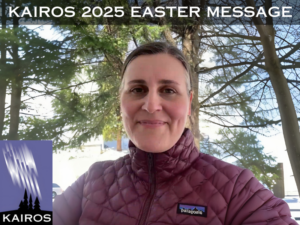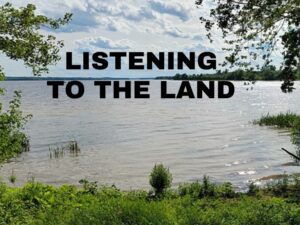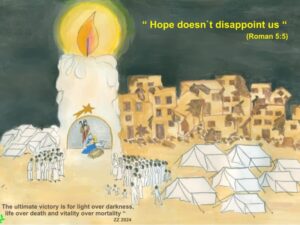We owe it to Indigenous peoples everywhere – to support their call for “our land, our rights, our peace.”
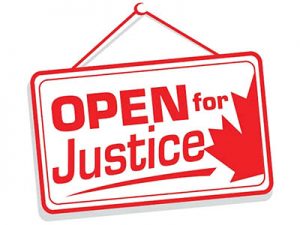
Nenita Condez is small in stature and pregnant with her third child. She is also courageous and defiant.
This tiny mother is leading her Subanen people in the struggle to defend their ancestral land in the southern Philippines, where a Canadian owned mining company is harming their land, their community and their way of life.
Because of her commitment to speak truth, Nenita lives under constant threat.
Nenita recently visited Canada, as one member of a delegation of 5 leaders from the Philippines, bringing a message of how Canadian mining companies are harming their land and their communities. The delegation met with government officials on Parliament Hill and did a speaking tour of major cities, calling for respect of “our land, our rights, our peace.” I heard Nenita speak in Winnipeg.
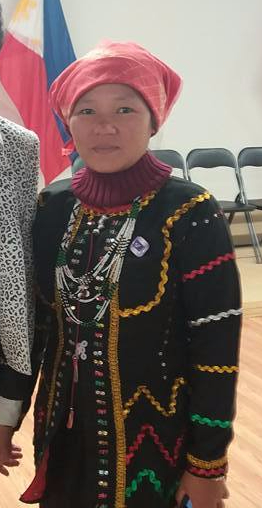 The delegation’s visit was sponsored by KAIROS, an ecumenical social justice coalition, of which MCC is a member. KAIROS has been advocating for years for accountability mechanisms for Canadian extractive companies overseas as part of a wider Open for Justice campaign. Canada is a global leader in international extractive industry; but has very weak mechanisms to hold mining companies to human rights and environmental standards.
The delegation’s visit was sponsored by KAIROS, an ecumenical social justice coalition, of which MCC is a member. KAIROS has been advocating for years for accountability mechanisms for Canadian extractive companies overseas as part of a wider Open for Justice campaign. Canada is a global leader in international extractive industry; but has very weak mechanisms to hold mining companies to human rights and environmental standards.
The Subanen people – one of numerous Indigenous groups in the Philippines – lives on the Zamboanga Peninsula of Mindanao Island in the southern part of the country. Zamboanga is rich in natural resources; it is also one of the most militarized regions in the country.
The Subanen have received certification of their ancestral domain, with the attending right of free, prior and informed consent to any extractive activities on their land. But this has not stopped foreign corporations from accessing the mineral resources or for using armed force to put down the resistance of the Subanen people.
Nenita focused her critique on Calgary-based TVI Pacific and its Philippine subsidiary TVIRD, which is extracting copper from Subanen land. According to her testimony, as well as the findings of a KAIROS delegation to the Philippines in 2014, the company began its operations without the due process of free, prior and informed consent. Moreover, its arrival in the community coincided with the cancellation of business permits for small scale mining operations, the deployment of armed “security” personnel, and the escalation of widespread human rights violations.
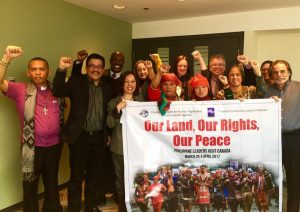
Philippine delegation with KAIROS hosts.
The reported human rights violations include: extrajudicial killings, illegal detention, kidnappings, destruction of property, homes and livelihoods, forcible eviction, as well as threats, harassment and intimidation. Thousands of people have been affected.
Nenita herself is continually being watched and harassed and is currently not able to return to her home because of fears she could be assassinated.
But this courageous woman refuses to be silenced. “Defending our ancestral land is of prime importance to us,” she says. “We cannot live without our land.”
She notes that land is not just a place for the Subanen people to live. The land defines their life, their health, the social fabric of their community, and their very identity.
Nenita is aware that the struggle of the Subanen people is part of a global struggle by Indigenous peoples seeking to protect lands that are coveted by governments and corporations for their forests, waters and minerals.
“We are calling for respect for Indigenous peoples rights,” she insists. “We hope our efforts to expose what is happening in the Philippines will touch people’s hearts and minds and lead to support for the global struggle.”
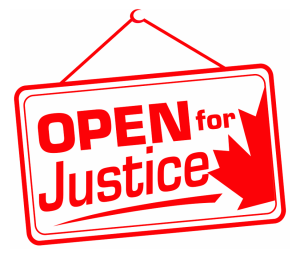 The Open for Justice campaign, which MCC supports, urges the Canadian federal government to take action in two specific ways:
The Open for Justice campaign, which MCC supports, urges the Canadian federal government to take action in two specific ways:
- to appoint an independent ombudsperson mandated to monitor Canadian extractive operations overseas, to investigate complaints and to take action where needed to uphold human rights (current mechanisms are voluntary and ineffectual); and
- to allow access to Canadian courts for non-Canadians who have been harmed by the international operations of Canadian companies.
The recently released federal budget failed to allocate funds for the creation of a human rights ombudsperson.
We owe it to people like courageous Nenita – and Indigenous peoples everywhere – to support their call for “our land, our rights, our peace.”
Originally published on the Mennonite Central Committee’s Ottawa Office website on April 19, 2017, by Esther Epp-Tiessen, Public Engagement Coordinator.









